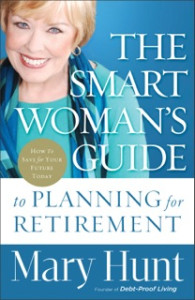 Remember those money books I recommended last week? I’m giving away one of them this week: Mary Hunt’s “The Smart Woman’s Guide to Planning for Retirement.”
Remember those money books I recommended last week? I’m giving away one of them this week: Mary Hunt’s “The Smart Woman’s Guide to Planning for Retirement.”
This is a terrific book filled with practical suggestions and plenty of encouragement for people who aren’t sure how to make their retirement dreams come true.
To enter to win, leave a comment here on my blog (not my Facebook page).
Click on the tab above the post that says “comments.” Make sure to include your email address, which won’t show up with your comment, but I’ll be able to see it.
If you haven’t commented before, it may take a little while for your comment to show up since comments are moderated. But rest assured, it will.
The winners will be chosen at random Friday night. Over the weekend, please check your email (including your spam filter). If I don’t hear from a winner by noon Pacific time on Monday, his or her prize will be forfeited and I’ll pick another winner.
Also, check back here often for other giveaways.
The deadline to enter is midnight Pacific time on Friday. So–comment away!



